2,4-DIISOPROPYLPHENOL
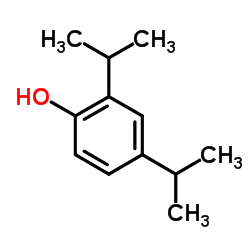
2,4-DIISOPROPYLPHENOL structure
|
Common Name | 2,4-DIISOPROPYLPHENOL | ||
|---|---|---|---|---|
| CAS Number | 2934-05-6 | Molecular Weight | 178.271 | |
| Density | 0.9±0.1 g/cm3 | Boiling Point | 244.0±9.0 °C at 760 mmHg | |
| Molecular Formula | C12H18O | Melting Point | N/A | |
| MSDS | Chinese | Flash Point | 109.6±7.2 °C | |
| Symbol |

GHS07 |
Signal Word | Warning | |
Use of 2,4-DIISOPROPYLPHENOL2,4-Diisopropylphenol is one of the most widely accepted chemical agent used for induction of anesthesia[1]. |
| Name | 2,4-Diisopropylphenol |
|---|---|
| Synonym | More Synonyms |
| Description | 2,4-Diisopropylphenol is one of the most widely accepted chemical agent used for induction of anesthesia[1]. |
|---|---|
| Related Catalog | |
| References |
| Density | 0.9±0.1 g/cm3 |
|---|---|
| Boiling Point | 244.0±9.0 °C at 760 mmHg |
| Molecular Formula | C12H18O |
| Molecular Weight | 178.271 |
| Flash Point | 109.6±7.2 °C |
| Exact Mass | 178.135757 |
| PSA | 20.23000 |
| LogP | 4.16 |
| Vapour Pressure | 0.0±0.5 mmHg at 25°C |
| Index of Refraction | 1.513 |
CHEMICAL IDENTIFICATION
HEALTH HAZARD DATAACUTE TOXICITY DATA
|
| Symbol |

GHS07 |
|---|---|
| Signal Word | Warning |
| Hazard Statements | H315-H319-H335 |
| Precautionary Statements | P261-P305 + P351 + P338 |
| Personal Protective Equipment | Eyeshields;full-face respirator (US);Gloves;multi-purpose combination respirator cartridge (US);type ABEK (EN14387) respirator filter |
| Hazard Codes | Xi: Irritant; |
| Risk Phrases | 36/37/38 |
| Safety Phrases | 26-36 |
| RIDADR | NONH for all modes of transport |
| RTECS | SL0800000 |
| HS Code | 2907199090 |
| Precursor 10 | |
|---|---|
| DownStream 6 | |
| HS Code | 2907199090 |
|---|---|
| Summary | 2907199090 other monophenols VAT:17.0% Tax rebate rate:9.0% Supervision conditions:none MFN tariff:5.5% General tariff:30.0% |
|
Synthesis and characterization of novel PUFA esters exhibiting potential anticancer activities: an in vitro study.
Eur. J. Med. Chem. 46 , 4878-86, (2011) Polyunsaturated fatty acids (PUFAs) have been reported to play a regulatory role in tumour growth progression. In the present study, we have synthesized ester derivatives of two important PUFA viz., l... |
|
|
Toxicological properties of thio- and alkylphenols causing flavor tainting in fish from the upper Wisconsin River.
J. Environ. Sci. Health B 24(4) , 349-60, (1989) EC50 Microtox (5 min, 25 degrees C) assay values for 2-isopropylphenol, 3-isopropylphenol, 4-isopropylphenol, 2,4-diisopropylphenol, 2,5-diisopropylphenol 2,6-diisopropylphenol, 3,5-diisopropylphenol,... |
|
|
Organic Reactions with Boron Fluoride. V. The Rearrangement of Isopropylphenol, o-, m-and p-Cresyl Ethers. Sowa FJ, et al.
J. Am. Chem. Soc. 55(8) , 3402-3407., (1933)
|
| EINECS 220-906-1 |
| MFCD01707536 |
| 2,4-di(propan-2-yl)phenol |
| 2,4-DIISOPROPYLPHENOL |
| Phenol, 2,4-bis(1-methylethyl)- |
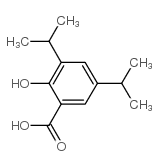 CAS#:2215-21-6
CAS#:2215-21-6 CAS#:187737-37-7
CAS#:187737-37-7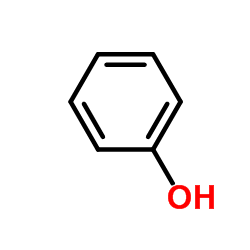 CAS#:108-95-2
CAS#:108-95-2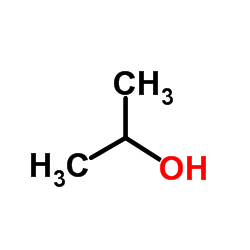 CAS#:67-63-0
CAS#:67-63-0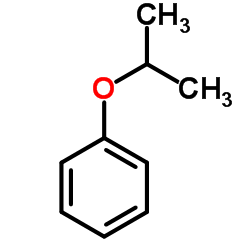 CAS#:2741-16-4
CAS#:2741-16-4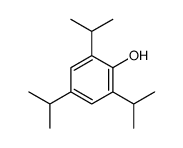 CAS#:2934-07-8
CAS#:2934-07-8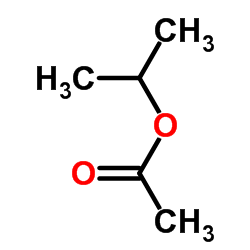 CAS#:108-21-4
CAS#:108-21-4 CAS#:7637-07-2
CAS#:7637-07-2 CAS#:2078-54-8
CAS#:2078-54-8 CAS#:35946-91-9
CAS#:35946-91-9 CAS#:37942-07-7
CAS#:37942-07-7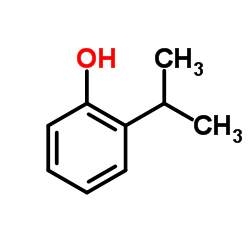 CAS#:88-69-7
CAS#:88-69-7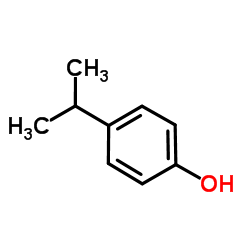 CAS#:99-89-8
CAS#:99-89-8
